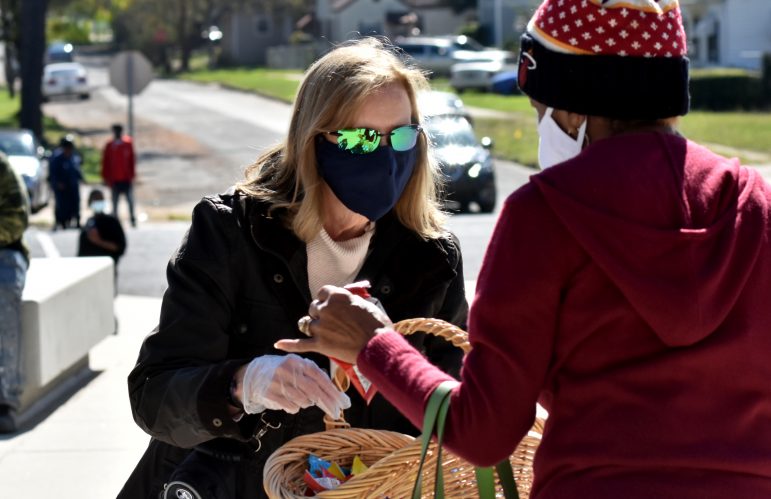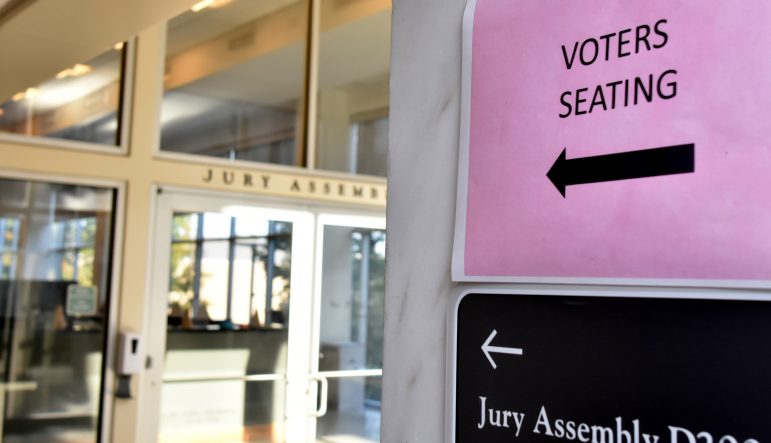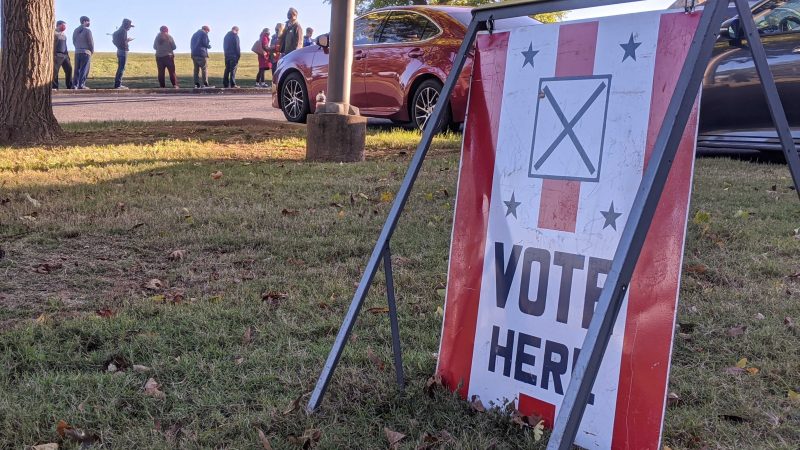As Other States Drew Fire For Passing Restrictive Election Laws, Alabama Skirted The Limelight
Fourteen states passed 22 election laws this year, some of which caused a stir as voting advocates complained that they restricted the rights of voters, while others argued the new laws were needed to add security to the vote.
Alabama has eight new election-related laws this year out of 27 voting-related bills introduced in the Legislature. While some stirred opposition in the state, it was nothing like the national outrage over changes in some other states. That’s at least partly because Alabama already had adopted one of the most controversial bills passed in other states – a requirement that voters show ID at the polls was passed here in 2014 – and because Georgia attracted so much attention for its ban on delivering water to voters standing in line at the polls.
Alabama did pass a few other laws. One to ban curbside voting, which was not being offered in any of the counties, anyway. Others require a partial post-election audit in three counties, move up the deadline for applying to vote by absentee ballot, and specifically make it a crime to vote in Alabama and another state, for instance.
Perhaps most controversial, Georgia adopted a law that prohibits any entity from giving water or food to voters waiting to get inside a polling place. Refreshments cannot be within 150 feet of a poll or within 25 feet “of any voter standing in line,” according to the law. Violation is punishable by a $1,000 fine.
President Biden has said the Georgia law “makes it a crime to provide water to voters while they wait in lines Republican officials themselves created by reducing the number of polling sites across the states, disproportionately in black neighborhoods.”

Solomon Crenshaw Jr.,Birmingham Watch
Deb O’Hara and her husband, Charlie, passed out provisions to voters standing in long lines at Legion Field in 2020, a courtesy that cannot be extended on election day in Georgia anymore.
The nationwide changes to the laws are, in part, due to fallout from last year’s election, when restrictions to election laws, primarily absentee voting, were lessened because of COVID-19 considerations.
Other laws echo former President Donald Trump’s false claim that loose election laws allowed fraud to taint the 2020 presidential race.
Alabama Democratic Party Executive Director Wade Perry said legislatures are “creating solutions in search of problems. They should be making it easier for people to vote.”
He suggested laws that would extend the hours and the days of voting.
“Younger folks who have lived in other states ask why voting in Alabama is so darn complicated,” Perry said.
But Alabama Secretary of State John Merrill said laws passed in Alabama were necessary to increase the security of elections.
Merrill, who served as national chair of the Republican Secretaries of State last year, co-chaired a Republican State Leadership Committee last spring to write a document for legislatures on election integrity.
Merrill said the request for the document came from Karl Rove, a Republican Party strategist.
The committee included Secretaries of State Laurel Lee of Florida, Michael Adams of Kentucky, Tre Hargett of Tennessee and Kim Wyman of Washington.
Alabama’s New Voting Laws
One law, called the Alabama Voter Confidence Act, requires the Secretary of State and three probate judges to conduct a one-time, post-election audit in three counties after the Nov. 8, 2022, general election.
It is a test run.
The results of the post-election audit will be posted on the courthouse doors of the three counties selected, and findings will be posted on the Secretary of State’s website.
The county judges have not been selected for the pilot program. Counties can apply for consideration, “but there is no need to look at it now as it is a year-and-a-half away,” Merrill said.
“We felt the law could have been stronger, but it was as strong as it needed to be,” he said.
The audit is to confirm the accuracy of the originally reported election outcome to increase voter confidence, Merrill said.
“This audit will confirm what our voters already know, that Alabama offers fair, honest and transparent elections,” Merrill said.
He said additional legislation will be necessary to continue with post-election audits.
The audit law was sponsored by David Standridge, R-Brewton, and Billy Beasley, D-Clayton.
Merrill said he is pleased with Alabama’s other new election laws, which include a ban on curbside voting, a law he fought for all the way to the U.S. Supreme Court and won.
The law requires all ballots and voting machines to remain in the polling precinct and not be taken to vehicles for persons to vote. The law was challenged by advocates of persons with disabilities. While curbside voting was suggested last year, no counties opted to offer it.
Another law requires candidates for mayor, council and school board to file reports and statements electronically with the Secretary of State.
Merrill said the measure will keep all state campaign reports in one centralized data base open to the public. It goes into effect Aug. 1, 2023.
Previously, candidates for those offices filed reports only with probate judges.
“Running for municipal office in cities that span multiple counties can be especially burdensome on candidates and those looking to access campaign finance documents,” said bill sponsor state Rep. Andy Whitt, R-Harvest.
Another municipal-related law changes the timeframe for runoff elections from six to four weeks for all special and municipal elections to be consistent with federal, state and county elections.
“It makes sure all of the deadlines are the same,” Merrill said.
The law is effective in January 2022.

Solomon Crenshaw Jr.,Birmingham Watch
Signs direct absentee voters in the Jefferson County Courthouse.
Another law updates the deadline for submitting applications for absentee ballots sent by mail from five to seven days before the election. But the deadline for delivering applications by hand remains five days before the election.
The change, Merrill said, ensures absentee ballot applications are processed and absentee ballots are sent with adequate time for voters to participate in elections.
Last year Alabama voters cast a record-breaking 305,663 absentee ballots.
The previous record was set in 2012, when 88,171 absentee votes were cast, according to Grace Newcombe, director of communications and governmental relations in Merrill’s office.
The law also removes the requirement for a postmark on absentee ballots because it is confusing and unnecessary, Merrill said.
As an example, he said one absentee vote was returned to a county last week dated July 2020.
Registered voter lists, under another new law, will no longer include identifiable personal information for those who are federal or state prosecutors, federal, state, probate or municipal judges, law enforcement officers, legislators or spouses of these people.
Voters who vote twice, once in Alabama and again in another state, can now be prosecuted in Alabama, under another law.
Merrill said the problem arose from people who own second homes in Alabama, primarily along the coast, who would vote in their home state on national or state issues and vote in Alabama, especially for municipal or property tax issues.
Now, violators can be charged with a Class A misdemeanor, and a second or subsequent violation would be a Class C felony.
“We did not have the ability to prosecute,” before the law change, Merrill said.
Lastly a new law revises the way Merrill’s office and boards of registrars across the state can update their voter databases by using change of address information supplied by the postal service.
The change will save the state a million dollars a year every four years because it eliminates the need to send mailers to every registered voter, according to the law.
Increase in military aid to Ukraine marks a shift in White House policy toward Russia
The Pentagon and U.S. military officials in Europe are working with NATO members to ship more Patriot missile systems to Ukraine and release more munitions that were briefly halted.
U.S. senator wants DOGE out of sensitive payment system for farmers
Sen. Tammy Baldwin, D-Wis., wants the USDA to revoke high-level access granted to the Department of Government Efficiency to a database that controls payments and loans to farmers and ranchers.
Lawyer says an Alabama teen who was killed by police was shot in the back
Authorities have not released police body camera video of the June 23 encounter or disclosed the name of the officer who shot 18-year-old Jabari Peoples in the parking lot of a soccer field in the affluent Birmingham suburb of Homewood. They also haven't released the findings of the county's official autopsy.
An Israeli restaurant owner quits a controversial Gaza food program after criticism
Shahar Segal, who runs popular restaurants around the world, has left his role as a spokesman for the Gaza Humanitarian Foundation amid calls to boycott his businesses.
Trump’s pick for U.N. Ambassador grilled over Signal chat scandal
Former national security adviser Mike Waltz, who was removed from office amid the Signal chat controversy, spent Tuesday in the Senate confirmation hearing for his nomination as U.S. ambassador to the United Nations.
5 takeaways from the 2025 Emmy nominations
Apple TV+ must be happy about how many nominations they've raked in this year for hit shows including Severance and The Studio, NPR critic Linda Holmes says.









